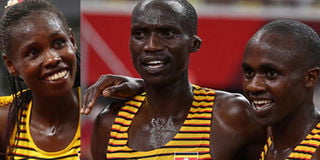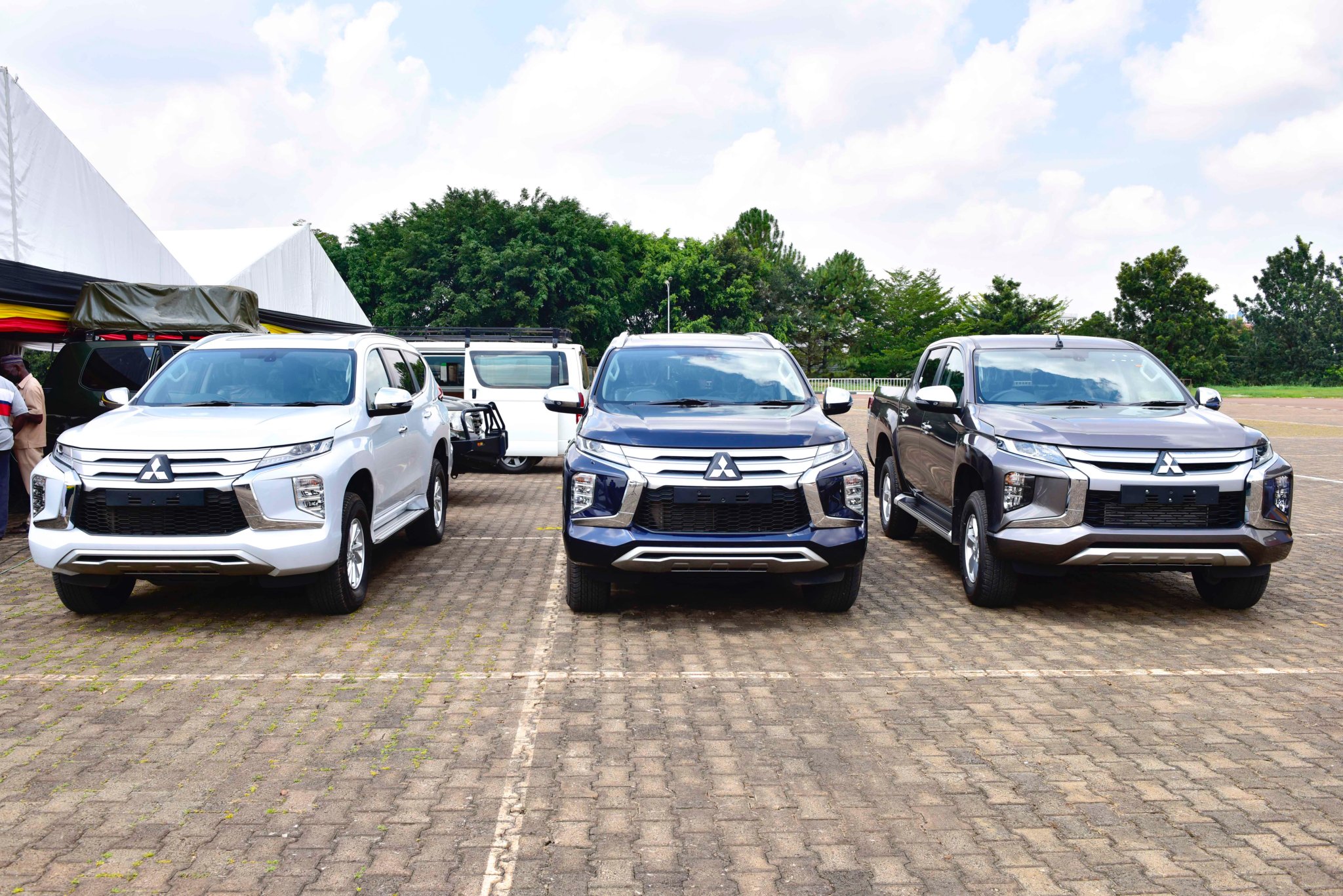Prime
Kapchorwa: The ‘home of friends’, star athletes and arabica

This photo combination created on August 9 shows Uganda's 2020 Olympics medallists Peruth Chemutai (gold), Joshua Cheptegei (gold and silver) and Jacob Kiplimo (bronze).
What you need to know:
- Last month, Uganda’s national athletics team at the 2020 Tokyo Olympics won the highest medal haul to date with two golds, one silver and one bronze.
In the local Sabiny language, Kapchorwa means “home of friends.” The hilly, lush green region on the ranges of Mount Elgon – an extinct volcano that straddles Uganda and Kenya – was named so because the Sabiny people consider themselves very friendly people.
Traditionally nomadic pastoralists, the Sabiny are believed to have migrated from Ethiopia and grazed their cattle in western Kenya before finding greener pastures and settling on the eastern slopes of Mt Elgon.
“We are naturally friendly, and welcoming people,” says William Cheptoek, a local tour guide with Discover Sipi, a Kapchorwa-based travel company.
For years, Kapchorwa and the Sabiny were synonymous with female genital mutilation, until a government ban and now Kapchorwa is famous for being the home of Uganda’s long distance runners and arabica coffee.
In recent years, the Sipi Falls has also attracted both local and international adventure travellers.
At the just concluded 2020 Tokyo Olympics, Uganda won four medals – all of them by athletes who hail from Kapchorwa: Joshua Cheptegei (10,000 metres silver and 5,000 metres gold), Jacob Kiplimo (10,000 metres bronze) and Peruth Chemutai (3,000 metres steeplechase gold).

Uganda's 2020 Olympic medalists: Joshua Cheptegei, Peruth Chemutai and Jacob Kiplimo. PHOTO/COMBO
And they were not the first stars from Kapchorwa. Stella Chesang was a gold medalist in the 10,000 metres at the 2018 Commonwealth Games; Moses Kipsiro, a 2010 Commonwealth Games 5,000 metres gold medalist; and Steven Kiproitich, a gold medal winner in the marathon at the 2012 London Olympics marathon. They are all Sabiny from Mt Elgon region.
“We are a running nation,” said Benjamin Njia, a former professional athlete and now the national team coach. He runs a high-altitude training camp on the foothills of Mt Elgon in Kapchorwa.
The Sabiny are distance relatives of the Oromo people of Ethiopia and closer to the Kalenjin of Kenya – the world’s best long distance runners.
“The fact that we are from the high-altitudes means that we usually have expanded lungs so we can run long distances without getting easily exhausted,” he says.
Now recognised as the running Mecca of Uganda and a permanent training base for elite athletes, Kapchorwa boasts of the Taryet elite athletics training facility (at 2,600 metres above sea level) and the Cheptegei Training Centre, a legacy project set up by international athlete Joshua Cheptegei.
Visitors to Kapchorwa can enjoy the 100-metre Sipi Falls from the Sipi Falls Lodge on the foothills of Mt Elgon, trek to the peaks of Mt Elgon or cycle and run in the scenic countryside among elite athletes organised by local tour operators such as Run Kapchorwa.
The Sipi area is also one of the biggest producers of arabica coffee in this region, and according to the guide, the “coffee experience” is an activity that’s fast gaining popularity.
My cultural experience started in Teryet village, 20Km north of Kapchorwa town. Rising 2,600 metres above sea level, the air here is cool making walks reinvigorating.
I visited a local, “open space bar” for Kapchorwa’s sweet local brew called Honey Wine whose ingredients, I was told, includes honey and local herbs from the nearby Mt Elgon Forest.
My Kapchorwa trip ended with a visit to Mise Cave on the slopes of Mt Elgon, which is where the story of the Sabiny in Uganda starts from, according to Cheptoek. But the reason I was here was because of the famous runners of Kapchorwa.
Last month, Uganda’s national athletics team at the 2020 Tokyo Olympics won the highest medal haul to date with two golds, one silver and one bronze.

This picture taken on August 11, 2021 shows the cars that were given to Uganda's Olympic medalists by President Museveni at Kololo Ceremonial grounds. PHOTO/ PPU
The winners – Joshua Cheptegei (gold and silver), Peruth Chemutai (gold) and Jacob Kiplimo (bronze) – returned to a heroic welcome and hosted by President Yoweri Museveni in Kololo, Kampala, on August 11, and showered with goodies.
At the function, there was a man who looked on silently but proudly: Benjamin Njia, the national athletics team coach.
“I think I am lucky that since I took over as coach of the national athletics team I have rarely led my team to a championship and returned empty-handed,” Mr Njia told me during my recent visit.
Njia took up coaching the national athletics team in 2014 when he was only 26 years old and a fresh graduate of industrial and organisational psychology from Makerere University.
Njia was a successful athlete as a student, winning a bronze medal in the 10,000 metres race at the 2013 World University Games in Russia, a bronze medal in the 10,000 race in the East Africa University Games in Dar es Salaam, Tanzania in 2014, as well as double gold in the 10,000 and 5,000 metre races at the All Africa University Games in Namibia the same year.
He however chose to retire early in order “to streamline administration in our sports,” he says of his decision.
And seven years into his coaching career, Njia doesn’t regret his decision, especially following his side’s historic triumph at the just-concluded Tokyo Games.
The 33-year-old credits Faustino Kiwa, the man he succeeded in 2014 as national athletics team coach, for prodding him to move into sports administration after the latter spotted exceptional leadership qualities in the youngster.
“Kiwa recommended me to the Uganda Athletics Federation as his preferred successor because he appreciated my leadership skills during my years as the national athletics team captain,” Njia says. “He also recommended me to the Uganda Police to take over as the force’s athletics team’s coach.
And this set him on the road to being a successful athletics coach in the country. To set himself up for success, he pursued a diploma in sports management at the Uganda Olympics Committee in Kampala and a certificate in coaching at the Regional Athletics Centre in Nairobi.
Under his guidance Uganda’s national athletics team has made significant strides on the global scene.
Since its 1956 Olympics debut, Uganda has won only 11 medals – four of which were won in Tokyo 2020 under Njia.
Beyond the Olympics, Joshua Cheptegei, who trains under Njia in both the Uganda Police Athletics Club and Uganda National Athletics teams, is perhaps the man who has benefited the most from the latter’s laudable coaching skills.
Now the most decorated Ugandan athlete of all time, Cheptegei’s exploits while under the tutelage of Njia include, double gold in the 5,000 and 10,000 metre races at the 2018 Commonwealth Games, gold at the 2019 IAAF World Cross Country Championships, as well as gold and silver in the 5,000 and 10,000 metre races at the just-concluded 2020 Tokyo Olympics.
In 2020, Cheptegei also broke Ethiopian legend Kenenisa Bekele’s 5,000 and 10,000 world best time records.
Away from Cheptegei, another of Njia’s protégés who have caused a stir on the global athletics scene is 22-year-old Peruth Chemutai, who joined the Uganda Police training camp as a 14-year-old in 2013 shortly before Njia became the force’s athletics team coach the following year.
Under the guidance of Njia, Chemutai has secured her place in the anals of Uganda’s history as the first Ugandan female athlete to win any medal at the Olympics after clinching gold in the 3,000 metres steeplechase at the 2020 Tokyo Olympics.
“The Uganda Police has played a very big role in improving the fortunes of Uganda’s athletics,” says Njia, a Police Inspector. “Uganda Police usually identifies promising young athletes whom we enlist in our training camp and groom.”
There are currently 52 athletes at the Uganda Police athletics training camp in Kapchorwa. Thirty-two of these are professional athletes.
To ensure that their livelihoods are secure once their athletics careers are over, the Uganda Police usually gives basic police training to those that are interested in becoming police officers who are then given permanent jobs in the force.
Stella Chesang (gold medal winner in the 10,000 metres at the 2018 Commonwealth Games), Mercyline Chelangat (who also took part in the 2020 Tokyo Olympics), Peruth Chemutai and Joshua Cheptegei are all police officers who were first enlisted as athletes for the Uganda Police Athletics Club in their teens.
Njia believes Uganda can best Kenya in athletics on the global stage “because we now have many young athletes with a lot of potential. We just need to invest more in training facilities."
In Africa, Uganda was the second best performer at the Tokyo Olympics with four medals after Kenya with 10, four of them gold.
*Written by Gilbert Mwijuke




